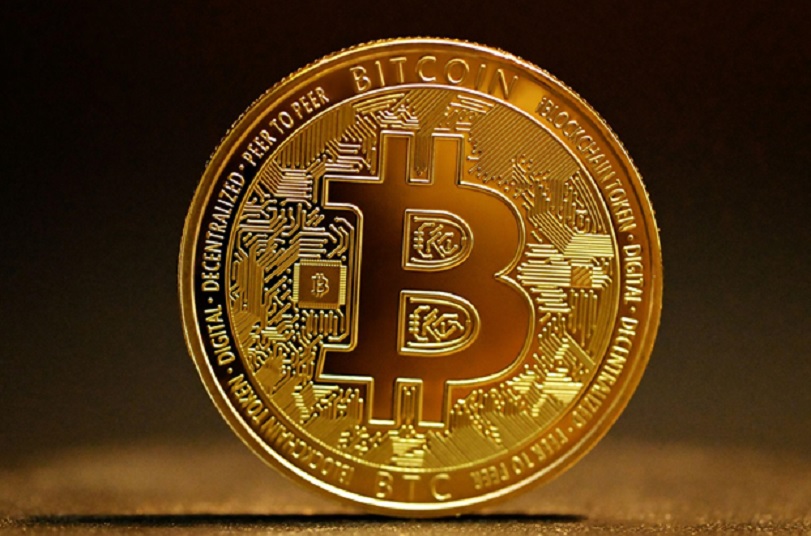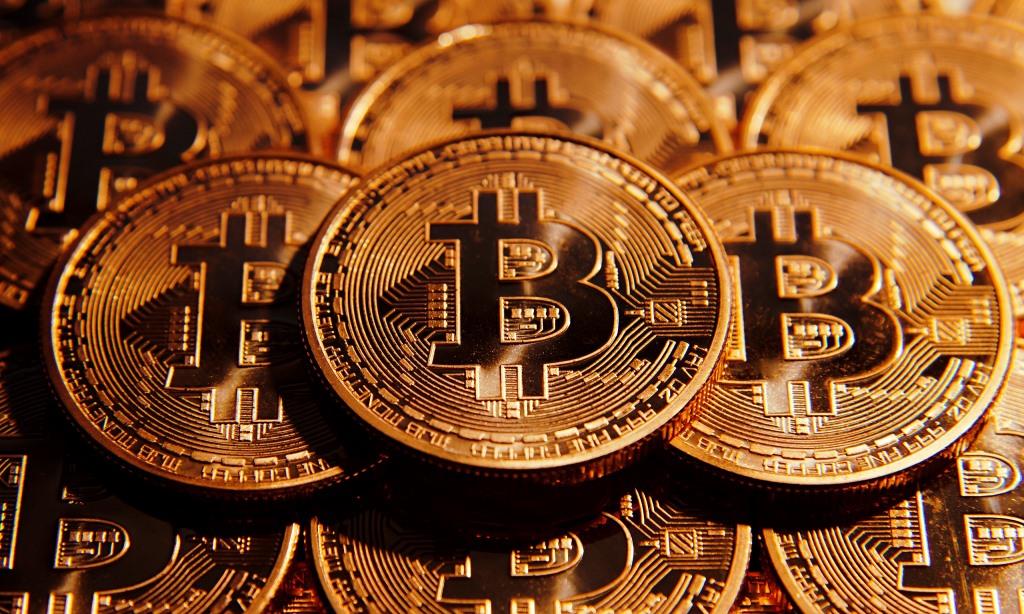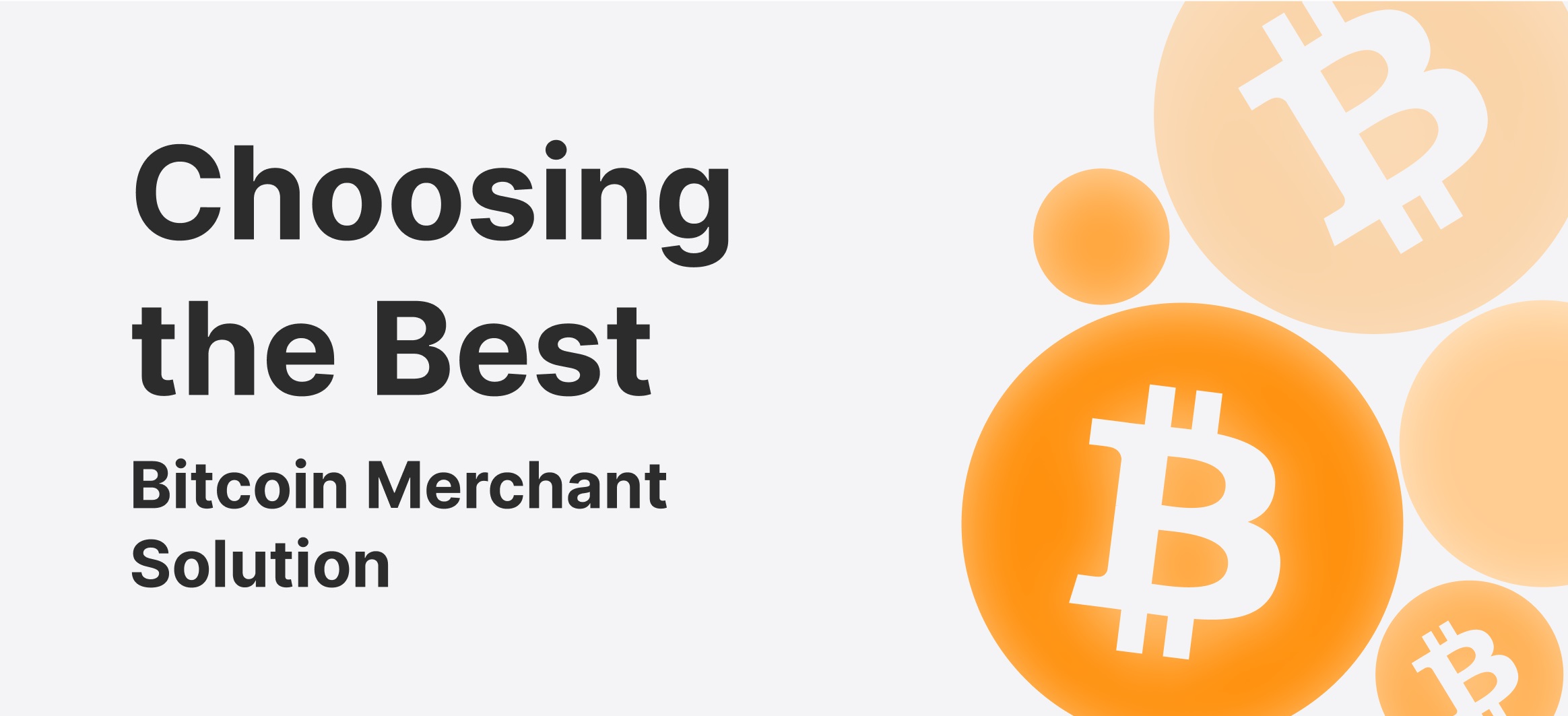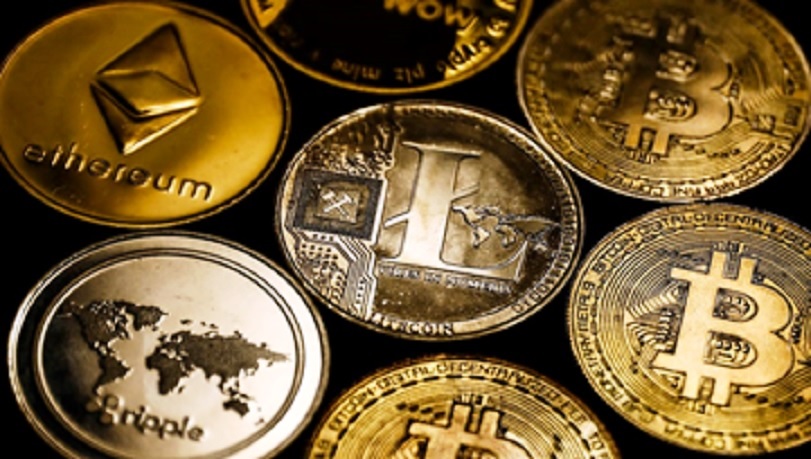Economy
How to Buy Your First NFT in Nigeria: A Step-by-Step Guide
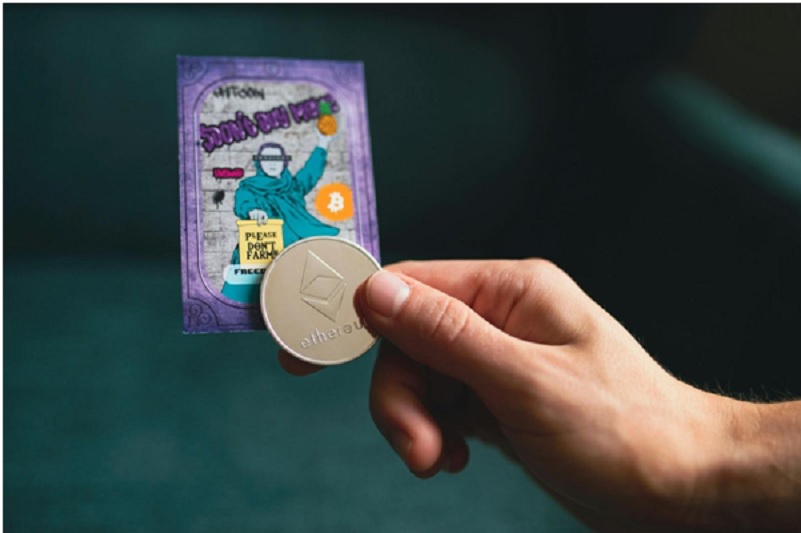
While the NFT hype from 2021 has passed, the NFT market is still very much active, attracting creators, brands, collectors, and investors who want to capitalize on this new technology.
In this step-by-step guide, we’ll discuss how you can buy your first NFT in Nigeria. For this guide, we’ll walk you through the Magic Eden platform and how you can use it to buy an NFT on Ethereum.
What You Need to Get Started
To buy your first NFT in Nigeria using Magic Eden, you will need three things: an NFT wallet, ETH, and an NFT marketplace.
- A crypto wallet that supports NFTs: A crypto wallet is a software program that stores your digital assets, such as NFTs. For this guide, we’ll demonstrate how to buy your first NFT in Nigeria using the Magic Eden Wallet.
- ETH: Once you have set up your wallet, you will need to buy some ETH tokens if you don’t already have some to buy the NFT and pay for transaction fees.
- NFT marketplace: Last but not least, you will need access to a suitable NFT marketplace, such as Magic Eden, a leading NFT marketplace that supports multiple blockchains.
Step-by-Step Guide to Buying an NFT on Magic Eden
Now that you know what you need, let’s take a look at the step-by-step guide on how you can buy an NFT on the Ethereum blockchain using the Magic Eden platform.
Set Up a Crypto Wallet
When looking to buy NFT, choosing a good crypto wallet is vital. For this guide, we’ll use the Magic Eden Wallet.
Visit MagicEden.io and click the ‘Wallet’ button, then ‘Install on Chrome’ to install the wallet on your browser.
The Magic Eden Wallet is available as a browser extension and mobile app for Android and iOS. For this step-by-step guide, we’ll install the wallet on the Chrome browser.

Next, click the ‘Add to Chrome’ button to install the wallet on your Chrome browser.
Once installed, click ‘Create New Wallet’ and follow the prompts to set up your Magic Eden Wallet. If you already have a Magic Eden Wallet, select the ‘I Have A Wallet’ option.
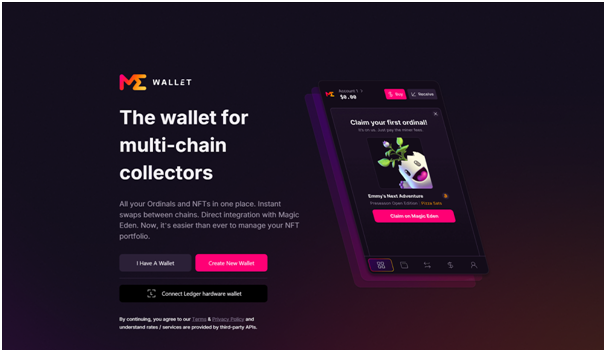
Next, create a strong password to prevent people from accessing your wallet.
Once you have successfully created and confirmed your password, you will be redirected to the below page.
Click ‘Go to Magic Eden’ to open the Magic Eden marketplace in another tab.
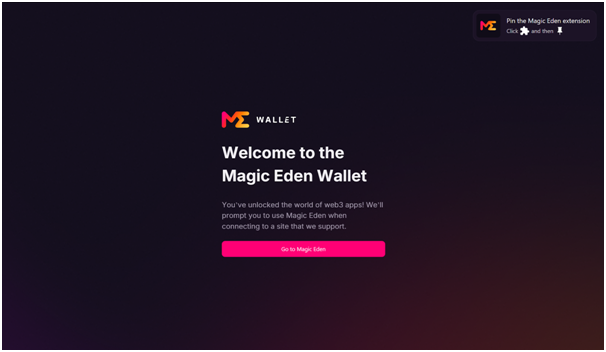
Next, you will need to secure your wallet by backing it up. Click ‘Back Up Now’, enter your password, write down your 12-word seed recovery phrase, and follow the prompts to back up your wallet.
Remember to keep your seed recovery phrase secure as that’s the only way you can recover your wallet and funds in case you lose access to your device.
And that’s it.
That’s how to create and set up your Magic Eden NFT Wallet as a Chrome browser extension.
Buy and Transfer ETH Tokens
With your crypto wallet set up, the next step will be to buy ETH tokens and transfer them to your wallet.
There are various platforms that you can use to buy ETH in Nigeria. Some platforms you can consider include Binance, KuCoin, Remitano, and other local exchanges.
For instance, you can buy ETH on Binance in Nigeria by creating a Binance account, verifying your identity, navigating to the ‘Buy Crypto’ segment, selecting ETH, keying in the amount you want to purchase, choosing your preferred payment method, and following the on-screen prompts to finalize the purchase.
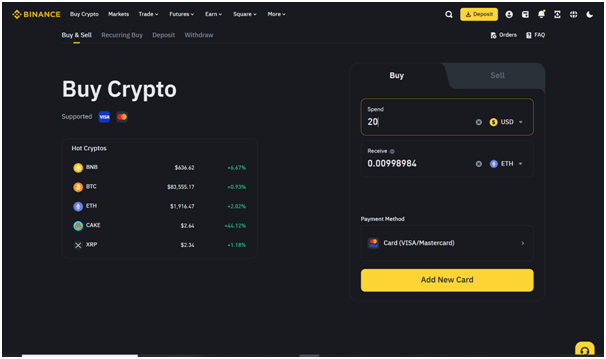
Once you acquire the ETH tokens, transfer them to your wallet by clicking on the ‘Withdraw’ button, select ETH, confirm the network, enter your Magic Eden Wallet address, and follow the on-screen prompts to withdraw your ETH tokens.
Connect Your Wallet to Magic Eden
Visit the Magic Eden platform, click ‘Log In, ’ and choose ‘View all wallets’ to log in or sign up via your crypto wallet.
Select Magic Eden Wallet from the list.
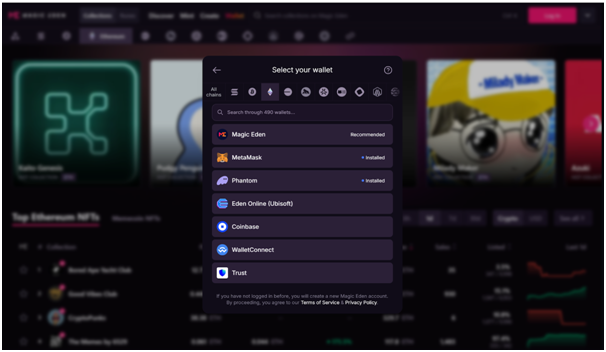
Next, choose the chain you’d like to connect to as shown below. Proceed to choose EVM.
Next, you will receive a pop-up from Magic Eden Wallet requesting you to accept the connection with the Magic Eden marketplace. Click ‘Continue with Magic Eden.’
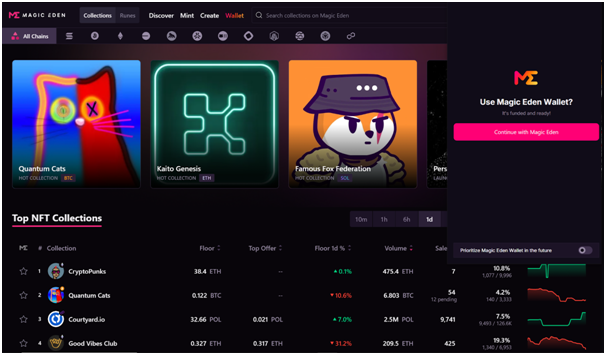
Click ‘Connect’ to link your Magic Eden Wallet to the Magic Eden marketplace.
Finally, confirm the signature request message on your wallet to connect your Magic Eden Wallet and the Magic Eden platform.
Find the Right NFT Collection
Now that you have successfully connected your crypto wallet to Magic Eden, the next step is to find the right Ethereum NFT collection.
You can search for trending Ethereum NFTs on Magic Eden by clicking on ‘Discover’ on the menu bar and then ‘Collections.’
You can also browse the provided NFT list and use the filter functionality to narrow your search results. Using the filter functionality, you can filter the different NFT collections by floor price, sales, verified collections, volume, and volume change.
Additionally, you can check the project details, community engagement, and roadmap before buying.
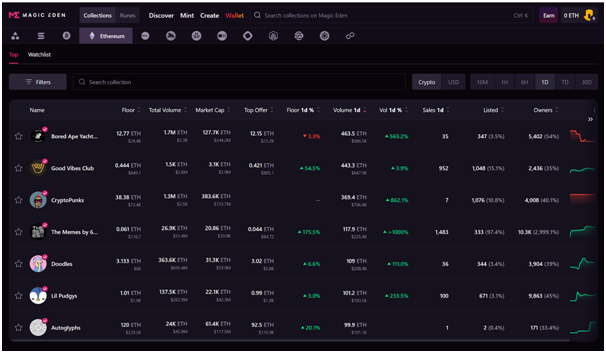
Buy Your First NFT
Once you have found the right NFT, it’s now time to buy your first NFT. There are two ways to buy an NFT on Magic Eden: ‘Buy Now’ for immediate purchase based on the listed price, or ‘Make an Offer,’ which allows you to bid and wait.
If your preferred NFT is available to buy immediately, click the ‘Buy Now’ option and follow the prompts to complete the purchase.
By clicking ‘Approve’ in your Magic Eden Wallet, a pop-up message will confirm the successful purchase of your NFT.
To view your NFT, navigate to the ‘Portfolio’ tab in your Magic Eden Wallet and click ‘Collectibles’ to see your NFTs.
And that’s it!
That’s how to buy your first NFT in Nigeria using the Magic Eden platform.
You can view your NFT purchase in your Magic Eden Wallet by going to your wallet, click on ‘Portfolio’ then ‘Collectibles’.
Conclusion
Getting started with NFTs can seem daunting but it becomes easier with time if you have the right guides, information, and platforms. Just remember to find and use a secure crypto wallet and a prominent NFT marketplace when buying NFTs in Nigeria.
Also, you can join various NFT community groups on Discord and Telegram to grow your knowledge and explore the NFT ecosystem.
Economy
Seven Price Gainers Boost NASD OTC Bourse by 2.19%

By Adedapo Adesanya
Seven price gainers flipped recent declines at the NASD Over-the-Counter (OTC) Securities Exchange, raising the alternative stock market by 2.19 per cent on Friday.
According to data, the market capitalisation added N51.24 billion to end N2.389 trillion compared with the previous day’s N2.338 trillion, while the NASD Unlisted Security Index (NSI) climbed 85.65 points to close at 3,994.32 points, in contrast to the 3,908.67 points it ended a day earlier.
Business Post reports that the advancers were led by MRS Oil Plc, which improved its value by N13.00 to N200.00 per share from N187.00 per share, FrieslandCampina Wamco Nigeria Plc gained N7.40 to settle at N91.55 per unit versus the previous day’s N84.15 per unit, Central Securities Clearing System (CSCS) Plc appreciated by N6.08 to N71.00 per share from N64.92 per share, Afriland Properties Plc added 66 Kobo to finish at N17.17 per unit versus N16.51 per unit, IPWA Plc rose 37 Kobo to N4.15 per share from N3.78 per share, First Trust Mortgage Bank Plc grew by 11 Kobo to N1.20 per unit from N1.09 per unit, and Food Concepts Plc went up by 10obo to N3.70 per share from N3.60 per share.
On the flip side, there were two price losers led by Geo-Fluids Plc, which depreciated by 28 Kobo to N3.32 per unit from N3.60 per unit, and Industrial and General Insurance (IGI) Plc dropped 5 Kobo to sell at 45 Kobo per share from 50 Kobo per share.
Yesterday, the volume of trades went down by 92.0 per cent to 3.7 million units from 45.8 million units, the value of transactions fell by 59.4 per cent to N84.5 million from N208.2 million, while the number of deals went up by 7.7 per cent to 42 deals from 39 deals.
CSCS Plc remained the most traded stock by value (year-to-date) with 32.6 million units exchanged for N1.9 billion, trailed by Geo-Fluids Plc with 119.6 million units valued at N470.3 million, and Resourcery Plc with 1.05 billion units traded at N408.6 million.
Resourcery Plc closed the day as the most traded stock by volume (year-to-date) with 1.05 billion units sold for N408.7 million, followed by Geo-Fluids Plc with 119.6 million units worth N470.3 million, and CSCS Plc with 32.6 million units worth N1.9 billion.
Economy
FX Demand Worries Weaken Naira to N1,346/$1 at Official Market

By Adedapo Adesanya
The Naira weakened further against the United States Dollar in the Nigerian Autonomous Foreign Exchange Market (NAFEX) on Friday, February 20, by N4.97 or 0.37 per cent to N1,346.32/$1 from the N1,341.35/$1 it was transacted on Thursday.
Heightened FX demand tilted the market toward the downside yesterday, exerting upward pressure on rates despite efforts by the Central Bank of Nigeria (CBN) to stabilise the foreign exchange market.
Also in the official market, the domestic currency depreciated against the Pound Sterling during the session by N9.39 to sell for N1,815.25/£1 versus the previous day’s N1,805.86/£1, and lost N7.33 against the Euro to close at N1,584.62/€1 compared with the preceding session’s N1,577.29/€1.
The story was not different for the Nigerian Naira at the GTBank FX desk, where it depleted against the Dollar by N7 on Friday to quote at N1,356/$1 versus the N1,349/$1 it was sold a day earlier, but remained unchanged in the black market at N1,370/$1.
It was observed that risky sentiment among Foreign Portfolio Investors (FPIs) contributed to the FX market, amid fears of hot money flight due to capital gains tax and other factors.
As for the cryptocurrency market, it was mostly green yesterday in reaction to a Supreme Court verdict dismissing a fresh 10 per cent global levy by President Donald Trump.
The apex court on Friday described Mr Trump’s global tariff rollout as illegal. The decision did not clarify what should happen to tariff revenue already collected, and it doesn’t necessarily spell the end of the trade agenda, with multiple legal and executive avenues still available.
Litecoin (LTC) grew 2.7 per cent to $55.00, Cardano (ADA) appreciated 2.6 per cent to trade at $0.2815, Binance Coin (BNB) expanded by 2.6 per cent to $627.19, Dogecoin (DOGE) recouped 1.3 per cent to quote at $0.1, Ripple (XRP) jumped 0.7 per cent to $1.43, Solana (SOL) improved by 0.5 per cent to $84.15, and Ethereum (ETH) soared 0.1 per cent to $1,962.78.
However, Bitcoin (BTC) lost 0.2 per cent to sell for $67,850.49, while the US Dollar Tether (USDT) and the US Dollar Coin (USDC) traded flat at $1.00 each.
Economy
Fidson, Jaiz Bank, Others Keep NGX in Green Territory

By Dipo Olowookere
A further 0.99 per cent was gained by the Nigerian Exchange (NGX) Limited on Friday after a positive market breadth index supported by 53 price gainers, which outweighed 23 price losers, representing bullish investor sentiment.
During the trading day, the trio of Jaiz Bank, Fidson, and NPF Microfinance Bank chalked up 10.00 per cent each to sell for N11.00, N86.90, and N6.27, respectively, while Deap Capital appreciated by 9.96 per cent to N7.62, and Mutual Benefits increased by 9.94 per cent to N5.42.
Conversely, Secure Electronic Technology shed 10.00 per cent to trade at N1.62, Sovereign Trust Insurance slipped by 9.73 per cent to N2.32, Ellah Lakes declined by 7.91 per cent to N12.80, International Energy Insurance retreated by 5.56 per cent to N3.40, and ABC Transport moderated by 5.26 per cent to N9.00.
Data from Customs Street revealed that the insurance counter was up by 2.52 per cent, the industrial goods sector grew by 2.28 per cent, the banking space expanded by 1.43 per cent, the consumer goods index gained 1.23 per cent, and the energy industry rose by 0.05 per cent.
As a result, the All-Share Index (ASI) went up by 1,916.20 points to 194,989.77 points from 193,073.57 points, and the market capitalisation moved up by N1.230 trillion to N125.164 trillion from Thursday’s N123.934 trillion.
Yesterday, investors traded 820.5 million stocks valued at N28.3 billion in 63,507 deals compared with the 898.5 million stocks worth N38.5 billion executed in 61,953 deals, showing a jump in the number of deals by 2.51 per cent, and a shortfall in the trading volume and value by 8.68 per cent and 26.49 per cent apiece.
Closing the session as the most active equity was Mutual Benefits with 79.0 million units worth N427.1 million, Zenith Bank traded 44.0 million units valued at N3.8 billion, Chams exchanged 43.9 million units for N182.0 million, AIICO Insurance transacted 42.4 million units valued at N179.8 million, and Veritas Kapital sold 36.0 million units worth N90.6 million.
-

 Feature/OPED6 years ago
Feature/OPED6 years agoDavos was Different this year
-
Travel/Tourism10 years ago
Lagos Seals Western Lodge Hotel In Ikorodu
-

 Showbiz3 years ago
Showbiz3 years agoEstranged Lover Releases Videos of Empress Njamah Bathing
-

 Banking8 years ago
Banking8 years agoSort Codes of GTBank Branches in Nigeria
-

 Economy3 years ago
Economy3 years agoSubsidy Removal: CNG at N130 Per Litre Cheaper Than Petrol—IPMAN
-

 Banking3 years ago
Banking3 years agoSort Codes of UBA Branches in Nigeria
-

 Banking3 years ago
Banking3 years agoFirst Bank Announces Planned Downtime
-

 Sports3 years ago
Sports3 years agoHighest Paid Nigerian Footballer – How Much Do Nigerian Footballers Earn



